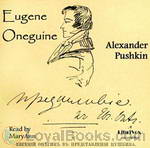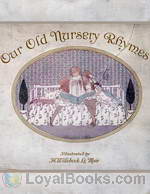|
Books Should Be Free Loyal Books Free Public Domain Audiobooks & eBook Downloads |
|
|
Books Should Be Free Loyal Books Free Public Domain Audiobooks & eBook Downloads |
|
Poetry |
|---|
|
Book type:
Sort by:
View by:
|
By: A. A. Milne (1882-1956) | |
|---|---|
 When We Were Very Young
When We Were Very Young
A.A. Milne wrote many poems to entertain his young son, Christopher Robin Milne, who appears to have been about three when "When We Were Very Young" was published. The book is a collection of 45 poems that celebrate a world and a point of view that a very young person could understand and enjoy. It became a best-seller. Christopher Robin is introduced as a character in some of the poems. We first meet him in the Preface, "Just Before We Begin." In it we learn of a swan which he feeds upon a lake and who he has named "Pooh... | |
By: Abraham Cowley (1618-1667) | |
|---|---|
 Wish
Wish
LibriVox volunteers bring you 13 recordings of The Wish by Abraham Cowley. This was the Fortnightly Poetry project for February 24, 2013. Abraham Cowley (/ˈkuːli/) was a leading English poet in the 16th century. | |
By: Abram Joseph Ryan (1838-1886) | |
|---|---|
 Farewells
Farewells
volunteers bring you 22 recordings of Farewells by Abram Joseph Ryan. This was the Weekly Poetry project for May 26, 2019. ------ Abram Joseph Ryan was an American poet, an active proponent of the Confederate States of America, and a Catholic priest. He has been called the "Poet-Priest of the South" and, less frequently, the "Poet Laureate of the Confederacy." - Summary by Wikipedia | |
By: Adam Lindsay Gordon (1833-1870) | |
|---|---|
 Song of Autumn
Song of Autumn
Adam Lindsay Gordon was an Australian poet, jockey and politician. | |
By: Adelaide Anne Procter (1825-1864) | |
|---|---|
 Three Rulers
Three Rulers
Adelaide Anne Procter was an English poet and philanthropist. She worked prominently on behalf of unemployed women and the homeless, and was actively involved with feminist groups and journals. She became unhealthy, possibly due to her charity work, and died of tuberculosis at the age of 38. Procter's literary career began when she was a teenager; her poems were primarily published in Charles Dickens's periodicals Household Words and All the Year Round and later published in book form. Her charity work and her conversion to Roman Catholicism appear to have strongly influenced her poetry, which deals most commonly with such subjects as homelessness, poverty, and fallen women... | |
 From Queen's Gardens
From Queen's Gardens
This is the third part of a collection of poetry written by English female poets. This part of From Queen's Gardens is a collection of 29 poems by Adelaide Anne Procter. - Summary by Carolin | |
By: Adelaide Crapsey (1878-1914) | |
|---|---|
 To The Dead in the Graveyard Underneath My Window
To The Dead in the Graveyard Underneath My Window
Her death was tragic. Full of the desire of life she yet was forced to go, leaving her work all unfinished. Her last year was spent in exile at Saranac Lake. From her window she looked down on the graveyard — "Trudeau's Garden," she called it, with grim-gay irony. from the forward to Verse, by Claude Bragdon - Summary by from the forward to Verse,by Claude Bragdon | |
By: Aemilia Lanyer (1569-1645) | |
|---|---|
 Salve Deus Rex Judaeorum
Salve Deus Rex Judaeorum
Aemilia Lanyer's 1611 poem is far more than a retelling of The Passion. It comprises a spirited defense of Eve (and, by extension, all women), elegant praises for her female patrons, a catalogue of virtuous women of the ancient world, and closes with the first "country house" poem written by a woman in English. | |
By: Albert Bigelow Paine (1861-1937) | |
|---|---|
 Mis' Smith
Mis' Smith
LibriVox volunteers bring you 15 recordings of Mis' Smith,/em>, by Albert Paine. This was the Weekly Poetry project for April 7th, 2013. | |
By: Albion Fellows Bacon (1865-1933) | |
|---|---|
 Songs Ysame
Songs Ysame
This is a volume of poetry written by the sisters Albion Fellows Bacon and Annie Fellows Johnston. Both of the sisters reached quite a level of fame in their own right, Ms Bacon primarily as a social reformer and Ms Johnston as an author of children's books. In this volume of poetry, they bring their two sets of skills together to write beautiful verses. - Summary by Carolin | |
By: Aldous Huxley (1894-1963) | |
|---|---|
 Defeat of Youth and Other Poems
Defeat of Youth and Other Poems
Though later known for his essays and novels, Aldous Huxley started his writing career as a poet. Published in 1918, The Defeat of Youth and Other Poems is his third compilation of poetry. The volume begins with "The Defeat of Youth", a sequence of twenty-two sonnets that explores irreconcilability of the ideal and the disappointing reality. Jerome Meckier called it “the century’s most successful sonnet sequence, better than Auden’s or Edna St. Vincent Millay’s.” In the rest of the volume, Huxley continues to explore themes started in The Burning Wheel, his first volume of poetry, including vision, blindness, and other contrasts... | |
 Wheels - The Second Cycle
Wheels - The Second Cycle
A series of six volumes of Wheels anthologies was produced by members of the Sitwell family between 1916 and 1922. The second volume, published in 1917, contains poems by the Sitwells and also Aldous Huxley, among others. - Summary by Algy Pug | |
By: Alexander Hamilton Laidlaw (1869-1908) | |
|---|---|
 American Girl
American Girl
Alexander Hamilton Laidlaw was born in Scotland. He graduated from Philadelphia Central High School in 1845. He practiced medicine from 1856-1905 and published some works including Soldier Songs and Love Songs, 1898, from which our Fortnightly Poem is taken. | |
By: Alexander Pope (1688-1744) | |
|---|---|
 An Essay on Man
An Essay on Man
Pope’s Essay on Man, a masterpiece of concise summary in itself, can fairly be summed up as an optimistic enquiry into mankind’s place in the vast Chain of Being. Each of the poem’s four Epistles takes a different perspective, presenting Man in relation to the universe, as individual, in society and, finally, tracing his prospects for achieving the goal of happiness. In choosing stately rhyming couplets to explore his theme, Pope sometimes becomes obscure through compressing his language overmuch... | |
 An Essay on Criticism
An Essay on Criticism
An Essay on Criticism was the first major poem written by the English writer Alexander Pope (1688-1744). However, despite the title, the poem is not as much an original analysis as it is a compilation of Pope’s various literary opinions. A reading of the poem makes it clear that he is addressing not so much the ingenuous reader as the intending writer. It is written in a type of rhyming verse called heroic couplets. | |
 The Rape of the Lock
The Rape of the Lock
The Rape of the Lock is a mock-heroic narrative poem written by Alexander Pope, first published anonymously in Lintot's Miscellany in May 1712 in two cantos (334 lines), but then revised, expanded and reissued under Pope's name on March 2, 1714, in a much-expanded 5-canto version (794 lines). The final form was available in 1717 with the addition of Clarissa's speech on good humour. The poem satirizes a petty squabble by comparing it to the epic world of the gods. It was based on an incident recounted by Pope's friend, John Caryll... | |
By: Alexander Pushkin (1799-1837) | |
|---|---|
 Eugene Onéguine
Eugene Onéguine
Eugene Onéguine is a classic of Russian literature, and its eponymous protagonist has served as the model for a number of Russian literary heroes (so-called superfluous men). It was published in serial form between 1825 and 1832. The first complete edition was published in 1833, and the currently accepted version is based on the 1837 publication.Almost the entire work is made up of 389 stanzas of iambic tetrameter with the unusual rhyme scheme "AbAbCCddEffEgg", where the uppercase letters represent feminine rhymes while the lowercase letters represent masculine rhymes... | |
 Winter Evening
Winter Evening
volunteers bring you 17 recordings of A Winter Evening by Alexander Pushkin, translated by Martha Dickinson Bianchi. This was the Fortnightly Poetry project for February 13, 2022. ----- Pushkin is a well-known Russian author and poet. Bianchi, the translator, was the niece of Emily Dickinson and is best known as an editor of Dickinson's poems. - Summary by TriciaG | |
By: Alfred Austin (1835-1913) | |
|---|---|
 Fortunatus' Song
Fortunatus' Song
Not all of the English poets laureate have been the greatest masters of verse. Alfred Austin, who assumed this post after Alfred Lord Tennyson, was one of the less distinguished - if more prolific - late Victorian poets. In modern times, his verse has become celebrated not for its smooth earnestness, but rather for the occasional howlers it contains. A notable example is this song from his pastoral epic Fortunatus the Pessimist, the final couplet of which is a popular favourite in anthologies of bad verse. - Summary by Algy Pug | |
By: Alfred Moffat (1866-1950) | |
|---|---|
 Our Old Nursery Rhymes
Our Old Nursery Rhymes
If you love and cherish old English nursery rhymes and have fond memories of your early childhood years, Our Old Nursery Rhymes by Alfred Moffat published in 1911 is indeed the little book for you! Or as a parent, if you'd like your own children to share the magic, this book provides them all. One of the most appealing aspects of this charming book is that the rhymes are all set to music and if you're musically inclined, you can certainly keep yourself and your children entertained by playing these pretty tunes... | |
By: Alfred Noyes (1880-1958) | |
|---|---|
 Drake
Drake
Alfred Noyes, in the blank-verse epic "Drake", fictionalizes the historical Francis Drake, who, during the reign of Elizabeth I of England, sailed (and plundered) on the Spanish Main and beyond. | |
By: Alfred, Lord Tennyson (1809-1892) | |
|---|---|
 In Memoriam A.H.H.
In Memoriam A.H.H.
In Memoriam is Tennyson’s elegiac tribute to his friend Arthur Henry Hallam, who died in 1833 at the age of 22. Tennyson wrote this long poem over 17 years as a chronicle of his mourning process. The poem became a favorite of Queen Victoria when she was grieving for her husband, and was one of the most popular and artistically influential poems of the Victorian period. | |
 Idylls of the King
Idylls of the King
Idylls of the King, published between 1856 and 1885, is a cycle of twelve narrative poems by the English poet Alfred, Lord Tennyson which retells the legend of King Arthur, his knights, his love for Guinevere and her tragic betrayal of him, and the rise and fall of Arthur's kingdom. The whole work recounts Arthur's attempt and failure to lift up mankind and create a perfect kingdom, from his coming to power to his death at the hands of the traitor Mordred. Individual poems detail the deeds of various knights, including Lancelot, Geraint, Galahad, and Balin and Balan, and also Merlin and the Lady of the Lake. | |
 The Princess
The Princess
The Princess is a serio-comic blank verse narrative poem, written by Alfred Tennyson, published in 1847. The poem tells the story of an heroic princess who forswears the world of men and founds a women's university where men are forbidden to enter. The prince to whom she was betrothed in infancy enters the university with two friends, disguised as women students. They are discovered and flee, but eventually they fight a battle for the princess's hand. | |
 Charge of the Light Brigade
Charge of the Light Brigade
This poem was published just six weeks after the event, its lines emphasize the valour of the cavalry in bravely carrying out their orders, regardless of the obvious outcome. The Charge of the Light Brigade was a charge of British light cavalry led by Lord Cardigan against Russian forces during the Battle of Balaclava on 25 October 1854 in the Crimean War. Lord Raglan, overall commander of the British forces, had intended to send the Light Brigade to pursue and harry a retreating Russian artillery battery, a task well-suited to light cavalry... | |
By: Algernon Charles Swinburne (1837-1909) | |
|---|---|
 Century of Roundels
Century of Roundels
A roundel (not to be confused with the rondel) is a form of verse used in English language poetry devised by Algernon Charles Swinburne (1837–1909). It is a variation of the French rondeau form. It makes use of refrains, repeated according to a certain stylized pattern. A roundel consists of nine lines each having the same number of syllables, plus a refrain after the third line and after the last line. The refrain must be identical with the beginning of the first line: it may be a half-line, and rhymes with the second line... | |
By: Alice Meynell (1847-1922) | |
|---|---|
 Fold
Fold
Alice Christiana Gertrude Meynell was an English writer, editor, critic, and suffragist, now remembered mainly as a poet. At the end of the 19th century, in conjunction with uprisings against the British (among them the Indians', the Zulus', the Boxer Rebellion, and the Muslim revolt led by Muhammad Ahmed in the Sudan), many European scholars, writers, and artists, began to question Europe's colonial imperialism. This led the Meynells and others in their circle to speak out for the oppressed. Alice Meynell was a vice-president of the Women Writers' Suffrage League, founded by Cicely Hamilton and active 1908–19. | |
By: Aline Kilmer (1888-1941) | |
|---|---|
 Autumn Walk with Deborah
Autumn Walk with Deborah
Librivox volunteers bring you eight readings of An Autumn Walk with Deborah by Aline Kilmer. This was the weekly poetry project for the week of October 12, 2014. | |
 Vigils
Vigils
This is a volume of poetry by American poet Aline Murray Kilmer, widow of the poet Joyce Kilmer. These poems have been published several years after Joyce Kilmer's death in 1918 while he was deployed in France, and their daughter Rose's death in 1917. Many of the poems in this collection thus also center around a motive of grief and loss, and set these emotions into poetry of heartbreaking beauty. - Summary by Carolin | |
 To Two Little Sisters of the Poor
To Two Little Sisters of the Poor
Aline Murray Kilmer , was an American poet, children's book author, and essayist, and the wife and widow of poet and journalist Joyce Kilmer . Aline attended the Rutgers College Preparatory School with her husband, Alfred Joyce Kilmer and married him soon after his graduation from Columbia University in 1908. In their short marriage, lasting 10 years, her husband had achieved fame as a poet, literary critic and among Catholic circles as America's most prominent Catholic writer. After his death in World War I, Aline began publishing her own poetry and a few children's books. Today, her work is largely forgotten. - Summary by Wikipedia | |
 In Spring
In Spring
Aline Murray Kilmer , was an American poet, children's book author, and essayist, and the wife and widow of poet and journalist Joyce Kilmer . Aline attended the Rutgers College Preparatory School with her husband, Alfred Joyce Kilmer and married him soon after his graduation from Columbia University in 1908. In their short marriage, lasting 10 years, her husband had achieved fame as a poet, literary critic and among Catholic circles as America's most prominent Catholic writer. After his death in World War I, Aline began publishing her own poetry and a few children's books. Today, her work is largely forgotten. - Summary by Wikipedia | |
By: Ambrose Bierce (1842-1914) | |
|---|---|
 Interpretation
Interpretation
LibriVox volunteers bring you 8 recordings of An Interpretation by Ambrose Bierce. This was the Weekly Poetry project for September 22, 2013. | |